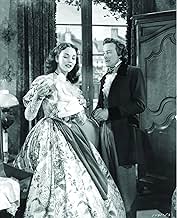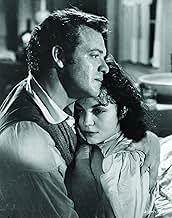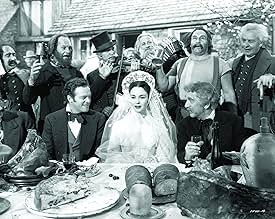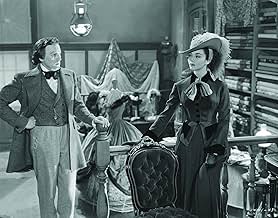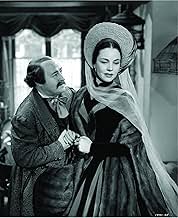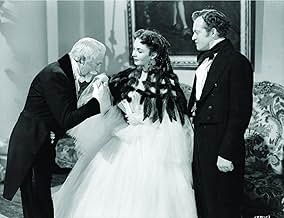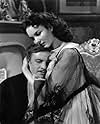CALIFICACIÓN DE IMDb
7.0/10
3.1 k
TU CALIFICACIÓN
Agrega una trama en tu idiomaA provincial doctor's wife's romantic illusions about life and social status lead her to betray her naive husband, take on lovers, and run up ruinous debts.A provincial doctor's wife's romantic illusions about life and social status lead her to betray her naive husband, take on lovers, and run up ruinous debts.A provincial doctor's wife's romantic illusions about life and social status lead her to betray her naive husband, take on lovers, and run up ruinous debts.
- Dirección
- Guionistas
- Elenco
- Nominado a 1 premio Óscar
- 2 premios ganados y 1 nominación en total
Alf Kjellin
- Leon Dupuis
- (as Christopher Kent)
Harry Morgan
- Hyppolite
- (as Henry Morgan)
- Dirección
- Guionistas
- Todo el elenco y el equipo
- Producción, taquilla y más en IMDbPro
Opiniones destacadas
Film opens at Flaubert's (Mason) 1857 trial for obscenity in France. After the prosecution finishes its' case, Flaubert answers; his answer frames a flashback to Emma Bovary's (Jones) story.
She grows up on an isolated farm, and is further isolated by her convent education. She grows up believing and fantasizing about love and romance, and that they happen in real life as in fiction. When Dr. Bovary (Heflin) comes to treat her fathers' broken leg, she sees him as her Prince Charming and falls in love with him. After the two marry, they go to the village in Normandy where Charles lives. .
Jones is extraordinary as Madame Bovary. She hits all the right notes as a girl who can't/doesn't separate fantasy from reality. She is marvelously subtle as a woman who switches from role to role in her fantasy life, and doesn't let reality intrude until it's too late. She at least deserved a Best Actress nomination from the Academy.
Van Heflin is good if overemphatic and too American as Emma's husband. Louis Jourdan is just about perfect as Emma's seducer who literally sweeps her off her feet. James Mason is fine as Flaubert.
Miklos Rozsa contributed a fine score, with especially notable music for the ball scene. Vincent Minnelli's direction is subtle. This is a very good film for a tearjerker. Jones and Minnelli are at their best.
She grows up on an isolated farm, and is further isolated by her convent education. She grows up believing and fantasizing about love and romance, and that they happen in real life as in fiction. When Dr. Bovary (Heflin) comes to treat her fathers' broken leg, she sees him as her Prince Charming and falls in love with him. After the two marry, they go to the village in Normandy where Charles lives. .
Jones is extraordinary as Madame Bovary. She hits all the right notes as a girl who can't/doesn't separate fantasy from reality. She is marvelously subtle as a woman who switches from role to role in her fantasy life, and doesn't let reality intrude until it's too late. She at least deserved a Best Actress nomination from the Academy.
Van Heflin is good if overemphatic and too American as Emma's husband. Louis Jourdan is just about perfect as Emma's seducer who literally sweeps her off her feet. James Mason is fine as Flaubert.
Miklos Rozsa contributed a fine score, with especially notable music for the ball scene. Vincent Minnelli's direction is subtle. This is a very good film for a tearjerker. Jones and Minnelli are at their best.
Films of great novels are usually light years away in terms of quality from their originals. There are of course a few exceptions, the David Lean Dickens adaptations for instance and recently a Neil Jordan version of Graham Greene's "The End of the Affair" that I much admired. Generally it is second rate literature, "Gone WIth the Wind" a prime example, that fares so much better. Flaubert's "Madame Bovary" has continued through the history and development of cinema and TV to exert its fascination on would-be translators, although it has to be admitted that it has generally proved elusive. One would have thought that it would have fared particularly well in the hands of outstanding French directors such as Renoir and Chabrol but their efforts to come to grips with Flaubert's masterpiece have ultimately to be judged as among their lesser works. There is quite a lot going for Jean Renoir's early 1933 version, not least the authentic Normandy exteriors shot with great affection, but technically the film shows its age. It is rather like a series of tableaux, some in themselves quite well done, but ultimately lacking a strong narrative thrust and sense of cohesion. Nevertheless I remember being more impressed with it than with Claude Chabrol's 1991 version which I found surprisingly cold and passionless. I admit I have only seen this once and my memory of it is far from clear, perhaps because it grabbed me so little at the time. It may seem rather preposterous to award the accolade for the best "Bovary" to Vincente Minnelli's Americanised 1949 MGM version with its studio mock-up of a French village that seems more of a Flanders lookalike and some location work clearly done in Californian woodland, but, in the absence of so little competition, I would have to plump for it as being certainly the most enjoyable. After all it has that quite exquisite beauty, Jennifer Jones, as the eponymous heroine, suffering and eventually dying as tenderly as only she can. My favourite memory from the film is her first appearance on the farm where Doctor Bovary is calling to tend to her sick father. There she is in a setting of all too believable rural squalor decked out in the most unbelievably opulent dress imaginable. If nothing else it makes Bovary's initial besottedness with her absolutely credible. Minnelli's is a rather sanitised adaptation. Okay to have the heroine die beautifully once the initial agony of taking poison has been established, but the inevitable outcome of a botched operation on a villager's clubfoot - amputation - is, unlike in the novel and other versions, evaded by the doctor's refusal to take on the medical challenge. It makes for rather more comfortable box-office. There are some beautifully done scenes including the almost obligatory inclusion in a Hollywood period piece of a ballroom sequence. The one here has the hedonistic movement that is everything we had come to expect from "The Great Waltz" onwards. There is also the heroine's wait, her bags fully packed in a windswept street after dark for the lover that never comes. Wyler did it rather better in "The Heiress" but Minnelli's has plenty of atmosphere. His version may be even further than its competitors from Flaubert's "Madame Bovary" but he invests it with enough passion and commitment to ensure it a small place in Hollywood history.
Although it is several years since I saw it I can remember the beautiful photography and period setting of this not very happy story of a tormented woman.Particularly Jennifer Jones,a vastly underrated actress giving a sensitive performance which one imagined could have done with a bit more directoral guidance. Minnelli was one of those directors who seemed to give all or nothing to his projects.By his own admission he had very little interest in "Kismet" as he wanted to get it out of the way in order to start "Lust for Life" with Kirk Douglas.The lumbering manner of "Kismet" shows this to be true !! (he owed MGM one picture under his contract before starting "Lust for Life" and unfortunately for the project "Kismet" was it)Additionally Minelli did not want Jones in the lead role and one wonders how influencial David Selznick was in pushing for Jennifer once Lana Turner was unavailable for the lead.At any rate Lana had not yet developed her dramatic abilities which would lie some years ahead.Jennifer showed that she was adaptable to many moods including a few years later her scene stealing turn in "Beat the Devil" few actresses can take credit for stealing a picture away from Bogie,Peter Lorre,Robert Morley and LaLolla. Back to Madame Bovary,although the subject is a heavy one,it is well handled by Minnelli,and most reference books today regard it as a sadly neglected piece,which deserves a wider recognition.Interestingly if my memory serves me correctly Vincente barely mentions it in his autobiography.Maybe his private life at the time and his more financially successful works figure more prominantly in his memory.If I had directed Madame Bovary I would be immensly proud of it.Maybe he was.
Madame Bovary is directed by Vincente Minnelli and adapted to screenplay by Robert Ardrey from the Gustave Flaubert novel. It stars Jennifer Jones, Van Heflin, Louis Jourdan, Alf Kjellin, Gene Lockhart and James Mason. Music is by Miklós Rózsa and cinematography by Robert H. Planck.
It's most interesting now watching Minnelli's picture and being able to place it in the time it was made. Also of major interest is reading up on what the critics of the time had to say about it. This version is an undoubted lesson in the technical crafts of film making, the visuals, the sound, art design, costuming and a literary pumped screenplay that allows the cast to play it classical. It's also black hearted, perfectly in keeping with the gathering storm of the era that was film noir.
Here is the monster.
Some of the complaints about the film, to me anyway, just don't add up. Why do we need to care about anyone in this story? It's a dark tale of illicit passions, greed, betrayals, bad parenting and etc. Is this frowned upon in some circles because of love for the classic novel? Or because there's some esteem held for other versions? The criticism of Jones is also very suspect given it's a classic femme fatale performance, Emma is cold and driven and shallow to others feelings, Jones works it perfectly.
As Rózsa's beautiful lush and poignant musical arrangements drift and hover over the various story instalments, Minnelli brings the film making guile. His camera work is sublime, like a ghost moving about the characters for the more vibrant scenes, tracking and roving, dizzyingly beautiful. At others it's close and personal, imbuing Emma's claustrophobia, with the black and white contrasts superbly photographed by Planck.
So it doesn't capture the essence of Flaubert's intent, then? Emma Bovary a figure of hate instead of sympathy, the lack of a caustic aside on a society of double standards? So what! Outstanding film making is just that, especially when it can tune into a style of film making prevalent at its birth. Madame Bovary - maybe the most film noir movie not actually considered a film noir. Brilliant. 9/10
It's most interesting now watching Minnelli's picture and being able to place it in the time it was made. Also of major interest is reading up on what the critics of the time had to say about it. This version is an undoubted lesson in the technical crafts of film making, the visuals, the sound, art design, costuming and a literary pumped screenplay that allows the cast to play it classical. It's also black hearted, perfectly in keeping with the gathering storm of the era that was film noir.
Here is the monster.
Some of the complaints about the film, to me anyway, just don't add up. Why do we need to care about anyone in this story? It's a dark tale of illicit passions, greed, betrayals, bad parenting and etc. Is this frowned upon in some circles because of love for the classic novel? Or because there's some esteem held for other versions? The criticism of Jones is also very suspect given it's a classic femme fatale performance, Emma is cold and driven and shallow to others feelings, Jones works it perfectly.
As Rózsa's beautiful lush and poignant musical arrangements drift and hover over the various story instalments, Minnelli brings the film making guile. His camera work is sublime, like a ghost moving about the characters for the more vibrant scenes, tracking and roving, dizzyingly beautiful. At others it's close and personal, imbuing Emma's claustrophobia, with the black and white contrasts superbly photographed by Planck.
So it doesn't capture the essence of Flaubert's intent, then? Emma Bovary a figure of hate instead of sympathy, the lack of a caustic aside on a society of double standards? So what! Outstanding film making is just that, especially when it can tune into a style of film making prevalent at its birth. Madame Bovary - maybe the most film noir movie not actually considered a film noir. Brilliant. 9/10
Three versions stand out as far as Flaubert's classic is concerned:the Jean Renoir one,with Valentine Tessier,which has not worn well,the acting has become unconvincing and almost lurid when you see it today,Minelli's version and Claude Chabrol's starring Isabelle Huppert ,which doesn't avoid totally academism,despite Jean-François Balmer's portrayal of Charles that steals the show . Now for Minelli 's attempt:some have been hard on his rendition,and however,it features the best Emma ever:Jennifer Jones,the romantic heroine par excellence.Her savage beauty,looking tense,triumphs here. The supporting acts are well-chosen:Van Heflin is oafish,meek.The French Louis Jourdan is well-cast as Rodolphe Boulanger,Emma's lover who betrays her and leaves her to despair.Their final confrontation,in Boulanger's luxury mansion oozes hatred and contempt. The main drawback is the rural background:Minelli did not realize how this country life disgusted Emma:the wedding,a very very peasant one ,which Flaubert describes in lavish detail,is too short on the screen.The farms are too clean-Emma dreamed her childhood away because she could not stand the mediocrity of her milieu.She jumped out of the frying pan into the fire:a two-bit doctor,a would-be sawbones who 's totally incompetent.Van Heflin's rendering makes up for Minelli's weaknesses.The movie is sandwiched between two brief scenes of Flaubert 's trial (He was accused of immorality in his book),that's redundant.It would have been better to tell the audience about Emma's daughter's terrible fate:after the doctor's death,an orphan,she becomes a worker in a spinning mill.Supreme decay for a mother who was longing to be a socialite.
¿Sabías que…?
- TriviaAfter the expensive box-office failure of El pirata (1948), director Vincente Minnelli worked hard to cut corners on this film, fearing he might be accused of extravagance. However, he devoted a great deal of time to the ball sequence, which he regarded as the most important scene in the film; he even had composer Miklós Rózsa compose the waltz theme used in it well in advance of the start of filming.
- ErroresWhen Madame Bovary asks Leon for money, he reacts by punching out one of the glass window panes. But on the next cut, the previously shattered window pane is now intact.
- Citas
Emma Bovary: Do you know, Charles, why that clock strikes? To announce the death of another hour.
- Versiones alternativasAlso shown in a computer colorized version.
- ConexionesFeatured in Some of the Best: Twenty-Five Years of Motion Picture Leadership (1949)
Selecciones populares
Inicia sesión para calificar y agrega a la lista de videos para obtener recomendaciones personalizadas
Everything New on HBO Max in August
Everything New on HBO Max in August
Looking for something different to add to your Watchlist? Take a peek at what movies and TV shows are coming to HBO Max this month.
- How long is Madame Bovary?Con tecnología de Alexa
Detalles
- Fecha de lanzamiento
- País de origen
- Sitio oficial
- Idioma
- También se conoce como
- Madame Bovary
- Locaciones de filmación
- Productora
- Ver más créditos de la compañía en IMDbPro
- Tiempo de ejecución
- 1h 54min(114 min)
- Color
- Relación de aspecto
- 1.37 : 1
Contribuir a esta página
Sugiere una edición o agrega el contenido que falta


